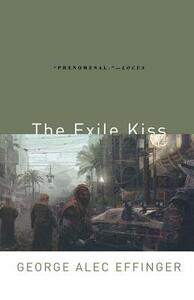Take a photo of a barcode or cover
There is no doubt that George Alec Effinger created a unique setting for his Marid Audran series, where instead of usual tropes of neon-bathed rainy streets brings Middle East flavored cyberpunk full of sex, violence, drugs and noir with a dash of LGBT. What makes his writing authentic is his knowledge of Arab customs, the way they talk and their mentality in general as if he spent some time living among them as some Lawrence of Arabia of cyberpunk. His Budayeen, even though modeled off a quarter where he used to live, bears resemblance with Dubai or Kuwait or any other capital in the Gulf area as you'll find all those things there: alcohol, drugs, sex workers, gays and transgenders with a bit of crime in the backdrop. However, neither [b:A Fire in the Sun|358991|A Fire in the Sun (Marîd Audran, #2)|George Alec Effinger|https://i.gr-assets.com/images/S/compressed.photo.goodreads.com/books/1442097387l/358991._SX50_.jpg|349114] or this novel reaches the brilliance of [b:When Gravity Fails|132694|When Gravity Fails (Marîd Audran, #1)|George Alec Effinger|https://i.gr-assets.com/images/S/compressed.photo.goodreads.com/books/1316729685l/132694._SX50_.jpg|127822], which is a damn shame. Bear in mind, even When Gravity Fails wasn't the perfect novel since Effinger in the last third loses the momentum of the previous two-thirds and can't finish the novel without deus ex machina solution, still it was fresh and brave and different.
The Exile Kiss finds Marid and big crime boss, Marid's grandfather, Friedlander Bey exiled to the desert for a crime they didn't commit and the first half of the novel is about their wandering with a Bedouin tribe as Marid recollects of events that led to their exile. The second half feels like a different novel, having our heroes back in Budayeen to clear their names. Effinger again reaches for deus ex machina solution making it another Scooby Doo mystery ending as in previous novels.
The only thing that saves this novel is Effinger's knowledge of culture and writing style. Plot-wise it's lacking.
The Exile Kiss finds Marid and big crime boss, Marid's grandfather, Friedlander Bey exiled to the desert for a crime they didn't commit and the first half of the novel is about their wandering with a Bedouin tribe as Marid recollects of events that led to their exile. The second half feels like a different novel, having our heroes back in Budayeen to clear their names. Effinger again reaches for deus ex machina solution making it another Scooby Doo mystery ending as in previous novels.
The only thing that saves this novel is Effinger's knowledge of culture and writing style. Plot-wise it's lacking.
adventurous
medium-paced
Plot or Character Driven:
A mix
Strong character development:
Complicated
Loveable characters:
Yes
Diverse cast of characters:
No
Flaws of characters a main focus:
Yes
Like its predecessors, this final volume in the Marid Audran trilogy holds up surprisingly well for a cyberpunk novel first published in 1991. Also like its predecessors, it often feels more like a contemporary mystery than it does science fiction.
An enjoyable read, and it's a shame that there aren't any more novels in the series.
An enjoyable read, and it's a shame that there aren't any more novels in the series.
I could not stop reading, and I'm saddened that with Effinger's death, we'll never visit Marid's world again. Truly excellent.
adventurous
dark
mysterious
tense
medium-paced
Plot or Character Driven:
A mix
Strong character development:
Complicated
Loveable characters:
Complicated
Diverse cast of characters:
Yes
Flaws of characters a main focus:
Yes




